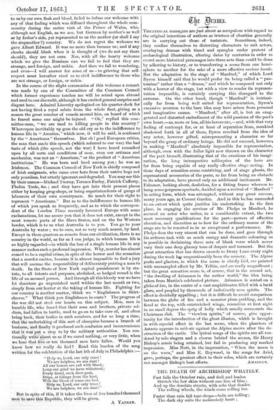THEATRICAL managers are just about as scrupulous with regard to
the original intentions of authors as trustees of charities generally are in carrying out those of testators. Sometimes, indeed, they confine themselves to distorting characters to suit actors, overlaying dramas with tinsel and spangles under pretext of archeological illustration, altering dates by centuries in order to crowd more historical personages into three acts than could be done by adhering to history, or to transferring a scene from one hemi- sphere to another for the sake of a more effective couleur locale. But the adaptation to the stage of "Manfred," of which Lord Byron himself said that he would prefer its being called a " pan- tomime" rather than a " drama," and which he composed not only with a horror of the stage, but with a view to render its represen- tation impossible, is certainly carrying this disregard to the extreme. On the other hand, though " Manfred" is intrinsi- cally far from being well suited for representation, Byron's excessive aversion to the bare idea may have arisen from personal and imaginative causes. "Manfred," after all, is but an exag- gerated and distorted embodiment of the wild passions of the poet's own heart,—as, more or less, all his heroes are, —and, with that very feeling of contempt for, or at least of separation from, mankind shadowed forth in all of them, Byron revolted from the idea of any actor, however gifted, misrepresenting a character so far beyond the grasp of ordinary beings. He did not succeed, however, in making " Manfred" absolutely impossible for representation, although, even with the fuller light now thrown on the character of the poet himself, illustrating that of the creations of his imagi- nation, the long introspective soliloquies of the hero are far from being capable of any really effective stage-acting. In these days of sensation-scene contriving, and of stage ghosts, the supernatural accessories of the poem, so far from being an obstacle to its adaptation, have proved only an additional incitement. Mr. Falconer, looking about, doubtless, for a fitting frame whereon to hang some gorgeous spectacle, decided upon a revival of " Manfred " in acting form, which was attempted, without any great success, many years ago, at Covent Garden. And in this he has succeeded to an extent which quite justifies his undertaking. In the first place, in engaging the services of Mr. Phelps as Manfred, he secured an actor who unites, to a considerable extent, the two most necessary qualifications for the part—powers of effective elocution, and discretion as to how far the ordinary means of the stage are to be resorted to in so exceptional a performance. Mr. Phelps does the very utmost that can be done, and goes through his arduous task with as much energy and dramatic colouring as is possible in declaiming three acts of blank verse which never vary their one deep gloomy tone of despair and torment. But the great attraction that has drawn crowds to Drury Lane every night during the week his unquestionably been the scenery. The Alpine peaks and glaciers, in which the scene is chiefly laid, are painted with unexampled effect by Mr. Telbin, and are really magnificent ; but the great sensation scene is, of course, that in the second act, " the dwelling of Arimanes in the nether world," the idea being taken from Martin's celebrated picture. Arimaues is seated on a globe of fire, in the centre of a vast amphitheatre filled with a lurid glare, and peopled by thousands of indistinctly seen spirits. The effect is decidedly appalling ; but it is difficult to avoid comparison between the globe of fire and a monster plum-pudding, and the fiend at the top, with outstretched wings, resembles at first sight in no small degree the sprig of holly which usually surmounts the Christmas dish. The "viewless spirits," of course, give oppor- tunity for the introduction of the ghost illusion, which is brought in with especial effect in the last scene, when the phantom of Astarte appears in mid-air against the Alpine snows after the de- struction of the castle. The lyrical songs of the spirits are all ren- dered by solo singers and a chorus behind the scenes, Sir Henry Bishop's music being retained, but fail in producing any marked impression Miss Nott, in the imprecation, " When the moon is on the wave," and Miss E. Heywood, in the songs for Ariel, gave, perhaps, the greatest effect to their solos, which are certainly not amongst Bishop's beat efforts. AMATEUR.






























 Previous page
Previous page